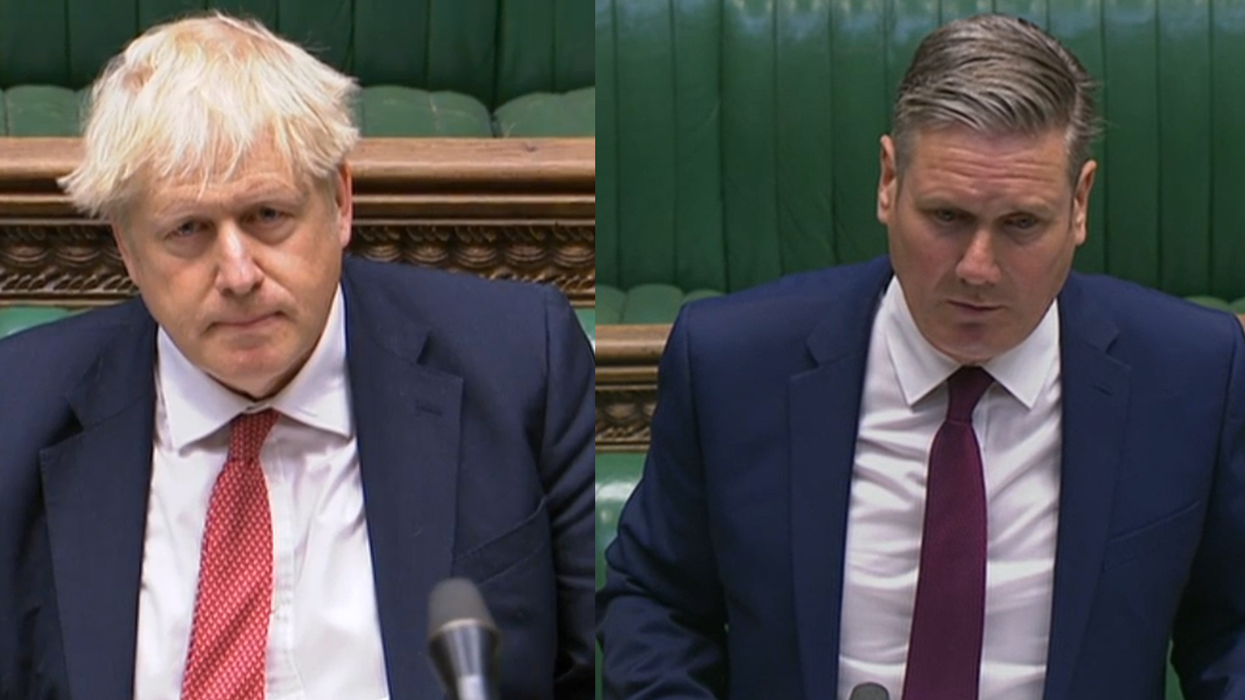Celebrities
Grahame Anderson
Sep 09, 2020
Each week at PMQs, we've become used to Boris Johnson resorting to some rather embarrassing and personal lines of attack against Keir Starmer.
In today's clash, as the two leaders traded blows on the government's approach to coronavirus testing, Johnson resorted to accusing Starmer of "attacking" the NHS to escape scrutiny. And who could forget the infamous occasion that he quipped, to a bleak backbench murmur, that Starmer had “more briefs than Calvin Klein”?
Starmer's past as a lawyer is something that Johnson seems very keen to politicise.
The Observer reported that Johnson was furious at his aides for leaving him unprepared at PMQs on 2 September, when Starmer demanded he withdraw a comment about the IRA. In response to this, he is alleged to have demanded they double down on attacks on Starmer’s lawyer past. Soon after this, over the last couple of months, we've seen government intensify its attack line on “activist lawyers” for having the cheek to stop them acting, well, illegally.
Johnson and Dominic Cummings appear to have calculated that teasing Starmer about his past as a lawyer will have a doubly damaging effect: first, that it will make him seem shifty “one brief today, another tomorrow”. Second, that there is, in the minds of voters, an innate suspicion of or dislike for lawyers.
But the Tories are struggling with this attack line for the same reason they are struggling more generally: people are not stupid.
By and large, people do not see Starmer as shifty.
For now, despite the Tories’ best efforts, they do not detect much in the way of contradiction in Starmer’s position on coronavirus lockdown. People can see clearly – clearly as Dominic Cummings on a joyride through County Durham – the contrast between the two men.
Johnson is the man who wrote two editorials with polar opposite Brexit views, publishing the one that seemed personally opportune. Johnson is the man who boasted of shaking hands with all he met at a hospital on the day SAGE said not to; Johnson is the man who gave the British people “a very simple instruction” about staying at home, before expending his government’s political capital on Cummings’s “eye test” fantasy.
Polls suggest Starmer is much more trusted by the public than Johnson.
Mid-July’s Opinium/Observer poll gave Johnson -15 for trustworthiness. It gave Starmer +18 (a 33pt lead).
As a lawyer myself, it is personally a relief to note that, wry smiles aside, people don’t hate lawyers either. YouGov polling shows that almost twice as many (44 per cent) thought that lawyers made good political leaders as thought they made bad ones (25 per cent). Only doctors, scientists and teachers fared better. Ex-journalists – you might be able to name at least one – fared much worse, with only 15 per cent thinking they made good leaders and 55 per cent thinking the opposite.
Johnson attacking Starmer’s lawyer past is even stranger when we consider that some of our most era-defining PMs were lawyers first.
Lawyers who ended up in Downing street include Disraeli, Gladstone, Atlee, Thatcher and Blair. There is also a tradition of independently-minded Tory backbench barristers – think Ken Clarke and Dominic Grieve – and the three former barristers in the new Parliamentary intake are all Tories: Sarah Dine, Nathalie Elphicke and my former Chambers roommate Laura Farris. Eight solicitors became MPs in 2019: all bar one are Tories.
Further afield in time and space, think of Barack Obama, Hilary Clinton, Jawaharlal Nehru, M. K. Gandhi. Five of the framers of the US Declaration of Independence were also members of the Middle Temple.
Johnson’s attacks on Starmer’s past double as swipes at social mobility, which Tories like him often claim to support.
Working people, struggling to make ends meet, want better for their kids than they had themselves. They want the government to give them a hand in achieving it.
This is personal to me. Like Starmer, I became a lawyer because it’s challenging, it’s stimulating, you can help people who can’t help themselves and, yes, there’s a decent living to be made. My dad worked for the police and my mam was a school dinner lady. I went to a pretty tough comprehensive school in South Shields: but it was funded properly by a Labour government under which it was plausible that a lad like me could go to university and achieve his dreams.
For people like my parents, I would gauge that most red wall voters see the likes of Starmer and think ‘I might not have been able to do that but I want my kid to have the option’.
In that way, sneering jibes about lawyers – especially from an Etonian whose government is now admitting it will break international law – hit all the wrong notes.
Grahame Anderson is an equalities and employment barrister. He is chair of the Society of Labour lawyers employment group.
Follow him on Twitter at @GrahameAnders.
Top 100
The Conversation (0)














